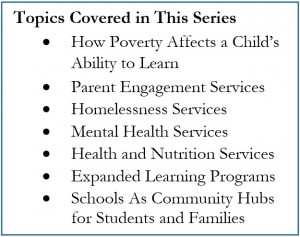The District’s approach to boosting student achievement needs to go beyond improving classroom instruction to also address the challenges that poor children bring with them to school. Low-income children are more likely than others to show up to school hungry or malnourished; exposed to trauma, stress and violence; affected by family or neighborhood instability; or coping with severe health problems.
A new series of reports from the DC Fiscal Policy Institute, Unlocking Opportunities, highlights how poverty affects children and their educational outcomes, and what DC schools are doing — and should be doing — to address it. The reports find that the District offers a number of programs to help low-income students succeed in the classroom, but there are still large gaps that need to be filled. 
Fortunately, services provided through schools can alleviate poverty’s impact — unlocking opportunities and allowing all students to reach their potential. From increasing attendance to raising grades and test scores, to decreasing discipline and behavior problems, supports that go beyond classroom instruction can remove the barriers to learning that low-income children face.
And school is an ideal location to deliver services. Children and families are more likely to take advantage of health and other services when they are located in a school. Staff delivering these services can work directly with teachers to let them know where to refer students and to offer advice on addressing problem behaviors in their classroom.
The District offers many programs that help low-income students ‘ helping students with mental health challenges, improving access to primary care, and providing nutritious meals, for example. But there are still large gaps. The number of homeless students is rising, but federal funding is low and falling. Approximately 5,000 DC children don’t have access to needed mental health services. And some school nurses and social workers have caseloads well beyond industry standards.
The District has a unique opportunity to expand non-instructional services for low-income students through the addition this year of an at-risk weight to the school funding formula. With $2,000 of additional funds per at-risk student, both DC Public Schools and public charter schools have new resources to help low-income students succeed.
The complete Unlocking Opportunities series takes a deeper look at services for students who are homeless, mental health services, expanded learning programs, schools as community hubs, parent engagement services and health and nutrition services in schools. Each of these briefs explores ways to remove the barriers to learning that poverty creates. Our final recommendations summarize important steps DC should take to lessen the impact that poverty has on children and thus boost educational outcomes in DC.
To read the complete Unlocking Opportunities series, click here.
To print a copy of today’s blog, click here.
